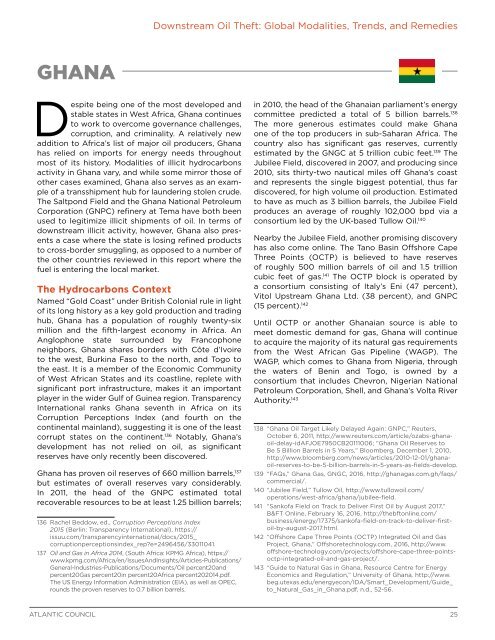DOWNSTREAM OIL THEFT
cAFWC5
cAFWC5
You also want an ePaper? Increase the reach of your titles
YUMPU automatically turns print PDFs into web optimized ePapers that Google loves.
Downstream Oil Theft: Global Modalities, Trends, and Remedies<br />
GHANA<br />
Despite being one of the most developed and<br />
stable states in West Africa, Ghana continues<br />
to work to overcome governance challenges,<br />
corruption, and criminality. A relatively new<br />
addition to Africa’s list of major oil producers, Ghana<br />
has relied on imports for energy needs throughout<br />
most of its history. Modalities of illicit hydrocarbons<br />
activity in Ghana vary, and while some mirror those of<br />
other cases examined, Ghana also serves as an example<br />
of a transshipment hub for laundering stolen crude.<br />
The Saltpond Field and the Ghana National Petroleum<br />
Corporation (GNPC) refinery at Tema have both been<br />
used to legitimize illicit shipments of oil. In terms of<br />
downstream illicit activity, however, Ghana also presents<br />
a case where the state is losing refined products<br />
to cross-border smuggling, as opposed to a number of<br />
the other countries reviewed in this report where the<br />
fuel is entering the local market.<br />
The Hydrocarbons Context<br />
Named “Gold Coast” under British Colonial rule in light<br />
of its long history as a key gold production and trading<br />
hub, Ghana has a population of roughly twenty-six<br />
million and the fifth-largest economy in Africa. An<br />
Anglophone state surrounded by Francophone<br />
neighbors, Ghana shares borders with Côte d’Ivoire<br />
to the west, Burkina Faso to the north, and Togo to<br />
the east. It is a member of the Economic Community<br />
of West African States and its coastline, replete with<br />
significant port infrastructure, makes it an important<br />
player in the wider Gulf of Guinea region. Transparency<br />
International ranks Ghana seventh in Africa on its<br />
Corruption Perceptions Index (and fourth on the<br />
continental mainland), suggesting it is one of the least<br />
corrupt states on the continent. 136 Notably, Ghana’s<br />
development has not relied on oil, as significant<br />
reserves have only recently been discovered.<br />
Ghana has proven oil reserves of 660 million barrels, 137<br />
but estimates of overall reserves vary considerably.<br />
In 2011, the head of the GNPC estimated total<br />
recoverable resources to be at least 1.25 billion barrels;<br />
136 Rachel Beddow, ed., Corruption Perceptions Index<br />
2015 (Berlin: Transparency International), https://<br />
issuu.com/transparencyinternational/docs/2015_<br />
corruptionperceptionsindex_rep?e=2496456/33011041.<br />
137 Oil and Gas in Africa 2014, (South Africa: KPMG Africa), https://<br />
www.kpmg.com/Africa/en/IssuesAndInsights/Articles-Publications/<br />
General-Industries-Publications/Documents/Oil percent20and<br />
percent20Gas percent20in percent20Africa percent202014.pdf.<br />
The US Energy Information Administration (EIA), as well as OPEC,<br />
rounds the proven reserves to 0.7 billion barrels.<br />
in 2010, the head of the Ghanaian parliament’s energy<br />
committee predicted a total of 5 billion barrels. 138<br />
The more generous estimates could make Ghana<br />
one of the top producers in sub-Saharan Africa. The<br />
country also has significant gas reserves, currently<br />
estimated by the GNGC at 5 trillion cubic feet. 139 The<br />
Jubilee Field, discovered in 2007, and producing since<br />
2010, sits thirty-two nautical miles off Ghana’s coast<br />
and represents the single biggest potential, thus far<br />
discovered, for high volume oil production. Estimated<br />
to have as much as 3 billion barrels, the Jubilee Field<br />
produces an average of roughly 102,000 bpd via a<br />
consortium led by the UK-based Tullow Oil. 140<br />
Nearby the Jubilee Field, another promising discovery<br />
has also come online. The Tano Basin Offshore Cape<br />
Three Points (OCTP) is believed to have reserves<br />
of roughly 500 million barrels of oil and 1.5 trillion<br />
cubic feet of gas. 141 The OCTP block is operated by<br />
a consortium consisting of Italy’s Eni (47 percent),<br />
Vitol Upstream Ghana Ltd. (38 percent), and GNPC<br />
(15 percent). 142<br />
Until OCTP or another Ghanaian source is able to<br />
meet domestic demand for gas, Ghana will continue<br />
to acquire the majority of its natural gas requirements<br />
from the West African Gas Pipeline (WAGP). The<br />
WAGP, which comes to Ghana from Nigeria, through<br />
the waters of Benin and Togo, is owned by a<br />
consortium that includes Chevron, Nigerian National<br />
Petroleum Corporation, Shell, and Ghana’s Volta River<br />
Authority. 143<br />
138 “Ghana Oil Target Likely Delayed Again: GNPC,” Reuters,<br />
October 6, 2011, http://www.reuters.com/article/ozabs-ghanaoil-delay-idAFJOE7950CB20111006;<br />
“Ghana Oil Reserves to<br />
Be 5 Billion Barrels in 5 Years,” Bloomberg, December 1, 2010,<br />
http://www.bloomberg.com/news/articles/2010-12-01/ghanaoil-reserves-to-be-5-billion-barrels-in-5-years-as-fields-develop.<br />
139 “FAQs,” Ghana Gas, GNGC, 2016, http://ghanagas.com.gh/faqs/<br />
commercial/.<br />
140 “Jubilee Field,” Tullow Oil, http://www.tullowoil.com/<br />
operations/west-africa/ghana/jubilee-field.<br />
141 “Sankofa Field on Track to Deliver First Oil by August 2017,”<br />
B&FT Online, February 16, 2016, http://thebftonline.com/<br />
business/energy/17375/sankofa-field-on-track-to-deliver-firstoil-by-august-2017.html.<br />
142 “Offshore Cape Three Points (OCTP) Integrated Oil and Gas<br />
Project, Ghana,” Offshoretechnology.com, 2016, http://www.<br />
offshore-technology.com/projects/offshore-cape-three-pointsoctp-integrated-oil-and-gas-project/.<br />
143 “Guide to Natural Gas in Ghana, Resource Centre for Energy<br />
Economics and Regulation,” University of Ghana, http://www.<br />
beg.utexas.edu/energyecon/IDA/Smart_Development/Guide_<br />
to_Natural_Gas_in_Ghana.pdf, n.d., 52-56.<br />
ATLANTIC COUNCIL<br />
25


